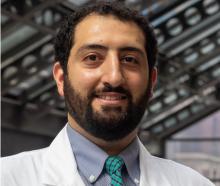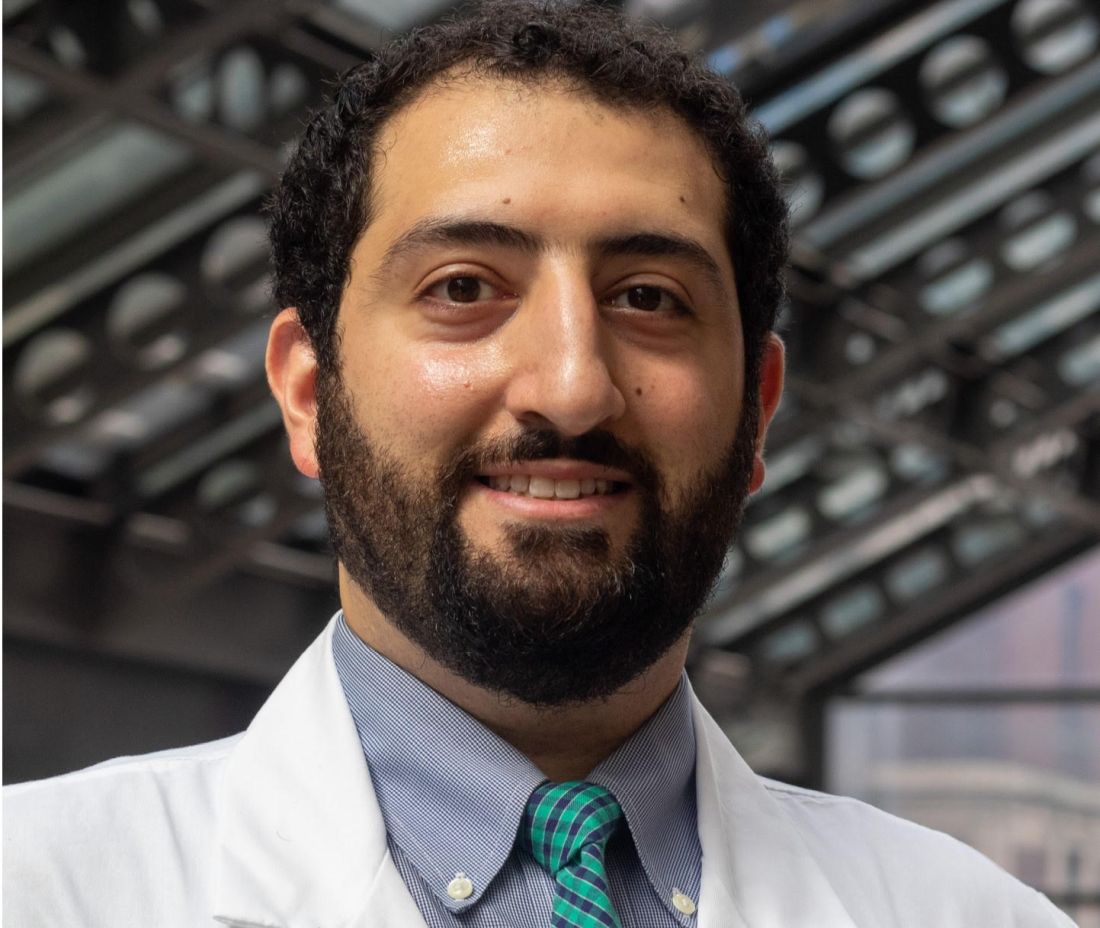User login
In 2023, CHEST awarded $300,000 in clinical research and community impact grants to 15 individuals. Grant recipients are recognized for their scientifically meritorious achievements, with rigorous metrics to track their project’s progress, and have innovative, novel approaches to addressing their research topic.
CHEST grants have made a difference in patients’ lives by leading to breakthroughs in the treatment and/or management of chest diseases and patient care. This year’s grant-funded projects run the gamut of topics within chest medicine, ranging from lung cancer and COPD to tuberculosis and idiopathic pulmonary fibrosis.
Here’s a glimpse into two of this year’s grant winners and their projects.
For a full list of the 2023 grant winners, visit chestnet.org/grant-recipients.
Air pollution in sarcoidosis
This year, the John R. Addrizzo, MD, FCCP Research Grant in Sarcoidosis was awarded to Ali Mustafa, MD, of the Johns Hopkins Hospital in Baltimore, MD, for his project “Air Pollution in Sarcoidosis.”
The project’s aim is to investigate the feasibility of studying indoor and outdoor air pollution in patients with pulmonary sarcoidosis.
According to Dr. Mustafa’s application, pulmonary sarcoidosis is one of the most common interstitial lung diseases in the United States, and mortality due to sarcoidosis has risen by more than 3% in recent decades.
While the etiology of sarcoidosis remains elusive, evidence points toward a combination of genetic predisposition with external environmental triggers affecting disease onset. One small study of 16 individuals with fibrotic pulmonary sarcoidosis assessed the association between local levels of outdoor air pollutants to clinical outcomes. This study found that increased short-term exposure was associated with increased respiratory symptom severity and worse health-related quality of life.
Additionally, significant health disparities exist in sarcoidosis. Black individuals with sarcoidosis have worse pulmonary function, higher rates of multiorgan disease, and as much as a 12-fold increase in mortality compared with non-Hispanic White individuals with sarcoidosis. Socioeconomic status and Black race have also been associated with increased exposure to air pollution and closer proximity to high toxic emission facilities, suggesting higher exposure to outdoor air pollution.
Racial disparities are present and particularly important in sarcoidosis. Black individuals are more likely to have more advanced disease at diagnosis, have a six-fold increase in hospitalization, and a 12-fold increase in mortality compared with non-Hispanic White individuals with sarcoidosis. Little is known about the drivers of these disparities; however, environmental exposure has been implicated in sarcoidosis pathogenesis and incidence and may be an important contributor.
Dr. Mustafa’s preliminary work suggests disparities in exposure to air pollution among individuals with sarcoidosis may be contributing to inequities in clinical outcomes.
Determinants of medication non-adherence among adults with chronic obstructive pulmonary disease
The CHEST/ALA/ATS Respiratory Health Equity Research Award was given to Stephanie LaBedz, MD, of the University of Illinois Chicago. The Respiratory Health Equity Research Award is jointly supported by the American Lung Association, the American Thoracic Society, and CHEST.
Dr. LaBedz’s project, “Determinants of Medication Non-Adherence Among Adults With Chronic Obstructive Pulmonary Disease,” aims to use behavioral science theory to identify barriers and facilitators to COPD medication adherence.
Studies suggest racial minorities and individuals of low socioeconomic status (SES) are less likely to be adherent to COPD medications compared with White and high SES patients with COPD. Interventions designed to improve COPD medication adherence must address barriers to adherence experienced by these groups to avoid perpetuating disparities in adherence and downstream outcomes disparities.
For her project, Dr. LaBedz will focus on examining barriers and facilitators of COPD medication adherence, including social determinants of health and other structural barriers faced by these vulnerable populations. She will use the information gained from the qualitative study to design interventions that address the barriers to adherence faced by these groups.
Her long-term goal is to improve COPD medication adherence in vulnerable patients with COPD in order to improve the health status and reduce health disparities experienced by racial/ethnic minority and low SES patients with COPD.
In 2023, CHEST awarded $300,000 in clinical research and community impact grants to 15 individuals. Grant recipients are recognized for their scientifically meritorious achievements, with rigorous metrics to track their project’s progress, and have innovative, novel approaches to addressing their research topic.
CHEST grants have made a difference in patients’ lives by leading to breakthroughs in the treatment and/or management of chest diseases and patient care. This year’s grant-funded projects run the gamut of topics within chest medicine, ranging from lung cancer and COPD to tuberculosis and idiopathic pulmonary fibrosis.
Here’s a glimpse into two of this year’s grant winners and their projects.
For a full list of the 2023 grant winners, visit chestnet.org/grant-recipients.
Air pollution in sarcoidosis
This year, the John R. Addrizzo, MD, FCCP Research Grant in Sarcoidosis was awarded to Ali Mustafa, MD, of the Johns Hopkins Hospital in Baltimore, MD, for his project “Air Pollution in Sarcoidosis.”
The project’s aim is to investigate the feasibility of studying indoor and outdoor air pollution in patients with pulmonary sarcoidosis.
According to Dr. Mustafa’s application, pulmonary sarcoidosis is one of the most common interstitial lung diseases in the United States, and mortality due to sarcoidosis has risen by more than 3% in recent decades.
While the etiology of sarcoidosis remains elusive, evidence points toward a combination of genetic predisposition with external environmental triggers affecting disease onset. One small study of 16 individuals with fibrotic pulmonary sarcoidosis assessed the association between local levels of outdoor air pollutants to clinical outcomes. This study found that increased short-term exposure was associated with increased respiratory symptom severity and worse health-related quality of life.
Additionally, significant health disparities exist in sarcoidosis. Black individuals with sarcoidosis have worse pulmonary function, higher rates of multiorgan disease, and as much as a 12-fold increase in mortality compared with non-Hispanic White individuals with sarcoidosis. Socioeconomic status and Black race have also been associated with increased exposure to air pollution and closer proximity to high toxic emission facilities, suggesting higher exposure to outdoor air pollution.
Racial disparities are present and particularly important in sarcoidosis. Black individuals are more likely to have more advanced disease at diagnosis, have a six-fold increase in hospitalization, and a 12-fold increase in mortality compared with non-Hispanic White individuals with sarcoidosis. Little is known about the drivers of these disparities; however, environmental exposure has been implicated in sarcoidosis pathogenesis and incidence and may be an important contributor.
Dr. Mustafa’s preliminary work suggests disparities in exposure to air pollution among individuals with sarcoidosis may be contributing to inequities in clinical outcomes.
Determinants of medication non-adherence among adults with chronic obstructive pulmonary disease
The CHEST/ALA/ATS Respiratory Health Equity Research Award was given to Stephanie LaBedz, MD, of the University of Illinois Chicago. The Respiratory Health Equity Research Award is jointly supported by the American Lung Association, the American Thoracic Society, and CHEST.
Dr. LaBedz’s project, “Determinants of Medication Non-Adherence Among Adults With Chronic Obstructive Pulmonary Disease,” aims to use behavioral science theory to identify barriers and facilitators to COPD medication adherence.
Studies suggest racial minorities and individuals of low socioeconomic status (SES) are less likely to be adherent to COPD medications compared with White and high SES patients with COPD. Interventions designed to improve COPD medication adherence must address barriers to adherence experienced by these groups to avoid perpetuating disparities in adherence and downstream outcomes disparities.
For her project, Dr. LaBedz will focus on examining barriers and facilitators of COPD medication adherence, including social determinants of health and other structural barriers faced by these vulnerable populations. She will use the information gained from the qualitative study to design interventions that address the barriers to adherence faced by these groups.
Her long-term goal is to improve COPD medication adherence in vulnerable patients with COPD in order to improve the health status and reduce health disparities experienced by racial/ethnic minority and low SES patients with COPD.
In 2023, CHEST awarded $300,000 in clinical research and community impact grants to 15 individuals. Grant recipients are recognized for their scientifically meritorious achievements, with rigorous metrics to track their project’s progress, and have innovative, novel approaches to addressing their research topic.
CHEST grants have made a difference in patients’ lives by leading to breakthroughs in the treatment and/or management of chest diseases and patient care. This year’s grant-funded projects run the gamut of topics within chest medicine, ranging from lung cancer and COPD to tuberculosis and idiopathic pulmonary fibrosis.
Here’s a glimpse into two of this year’s grant winners and their projects.
For a full list of the 2023 grant winners, visit chestnet.org/grant-recipients.
Air pollution in sarcoidosis
This year, the John R. Addrizzo, MD, FCCP Research Grant in Sarcoidosis was awarded to Ali Mustafa, MD, of the Johns Hopkins Hospital in Baltimore, MD, for his project “Air Pollution in Sarcoidosis.”
The project’s aim is to investigate the feasibility of studying indoor and outdoor air pollution in patients with pulmonary sarcoidosis.
According to Dr. Mustafa’s application, pulmonary sarcoidosis is one of the most common interstitial lung diseases in the United States, and mortality due to sarcoidosis has risen by more than 3% in recent decades.
While the etiology of sarcoidosis remains elusive, evidence points toward a combination of genetic predisposition with external environmental triggers affecting disease onset. One small study of 16 individuals with fibrotic pulmonary sarcoidosis assessed the association between local levels of outdoor air pollutants to clinical outcomes. This study found that increased short-term exposure was associated with increased respiratory symptom severity and worse health-related quality of life.
Additionally, significant health disparities exist in sarcoidosis. Black individuals with sarcoidosis have worse pulmonary function, higher rates of multiorgan disease, and as much as a 12-fold increase in mortality compared with non-Hispanic White individuals with sarcoidosis. Socioeconomic status and Black race have also been associated with increased exposure to air pollution and closer proximity to high toxic emission facilities, suggesting higher exposure to outdoor air pollution.
Racial disparities are present and particularly important in sarcoidosis. Black individuals are more likely to have more advanced disease at diagnosis, have a six-fold increase in hospitalization, and a 12-fold increase in mortality compared with non-Hispanic White individuals with sarcoidosis. Little is known about the drivers of these disparities; however, environmental exposure has been implicated in sarcoidosis pathogenesis and incidence and may be an important contributor.
Dr. Mustafa’s preliminary work suggests disparities in exposure to air pollution among individuals with sarcoidosis may be contributing to inequities in clinical outcomes.
Determinants of medication non-adherence among adults with chronic obstructive pulmonary disease
The CHEST/ALA/ATS Respiratory Health Equity Research Award was given to Stephanie LaBedz, MD, of the University of Illinois Chicago. The Respiratory Health Equity Research Award is jointly supported by the American Lung Association, the American Thoracic Society, and CHEST.
Dr. LaBedz’s project, “Determinants of Medication Non-Adherence Among Adults With Chronic Obstructive Pulmonary Disease,” aims to use behavioral science theory to identify barriers and facilitators to COPD medication adherence.
Studies suggest racial minorities and individuals of low socioeconomic status (SES) are less likely to be adherent to COPD medications compared with White and high SES patients with COPD. Interventions designed to improve COPD medication adherence must address barriers to adherence experienced by these groups to avoid perpetuating disparities in adherence and downstream outcomes disparities.
For her project, Dr. LaBedz will focus on examining barriers and facilitators of COPD medication adherence, including social determinants of health and other structural barriers faced by these vulnerable populations. She will use the information gained from the qualitative study to design interventions that address the barriers to adherence faced by these groups.
Her long-term goal is to improve COPD medication adherence in vulnerable patients with COPD in order to improve the health status and reduce health disparities experienced by racial/ethnic minority and low SES patients with COPD.


